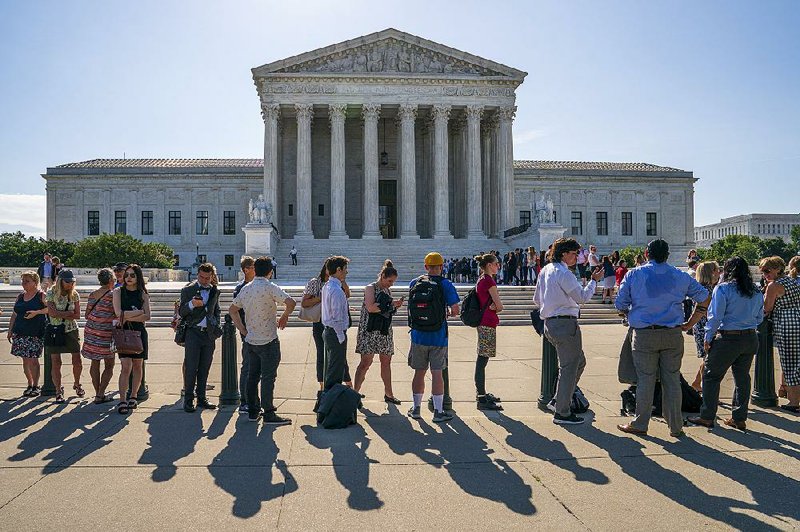The U.S. Supreme Court refused to question President Donald Trump's imposition of more than $4 billion in steel tariffs, turning away an appeal that challenged his use of national security as the legal justification for his trade agenda.
The appeal by a steel industry trade group and two of its members contended that the provision Trump invoked, known as Section 232, gives the president such broad discretion to impose tariffs on national security grounds that it violates the Constitution. The Supreme Court made no comment in refusing to hear the case.
"Section 232 essentially turns over to the president the entirety of Congress's constitutional power to impose tariffs and other restrictions on imports," the American Institute for International Steel argued in urging the court to take up the case.
The legal challenge is at an early stage before a federal appeals court has weighed in. The case could return to the Supreme Court later.
Trump imposed the 25% steel tariff, along with a 10% duty on aluminum imports, in March 2018. Some countries, including Brazil and South Korea, have negotiated deals to avoid the tariff, and Trump this year dropped the duty for imports from Canada and Mexico. But the tariffs still apply for much of world, including the European Union, China and Japan.
Trump is now threatening to invoke Section 232 to place tariffs on imported automobiles and parts.
The Trump administration urged the justices to reject the appeal, saying that "common sense and the inherent necessities of governmental coordination support a grant of discretion to the president" when it comes to national security.
The Supreme Court upheld Section 232 in 1976, saying it gives sufficient guidance to the president to pass constitutional muster.
The steel-industry trade group took the unusual step of asking the Supreme Court to directly review a ruling by the Court of International Trade and bypass the federal appeals court level. The Supreme Court rarely takes federal cases without an appeals court ruling.
Alan Morrison, the lawyer for the American Institute for International Steel, said the trade group would keep pressing its case at the U.S. Court of Appeals for the Federal Circuit in Washington.
"We are disappointed that the Supreme Court did not agree to hear this case now, but we will continue our efforts in the Federal Circuit to have section 232 declared unconstitutional," Morrison said in an email. "Once the Federal Circuit has spoken, we expect that the losing party will ask the Supreme Court to review that decision."
The Justice Department declined to comment.
The case is American Institute for International Steel v. United States, 18-1317.
In other cases:
• The court made it harder for news organizations and the public to obtain commercial information under the Freedom of Information Act.
Open government and reporters groups described the ruling against a South Dakota newspaper as a setback, but it was not clear how big its impact will ultimately be.
The Argus Leader was seeking to learn how much money goes annually to every store nationwide that participates in the government's $65 billion-a-year food assistance program, previously known as food stamps.
Reporters at the paper asked the federal government in 2011 to provide information about the Supplemental Nutrition Assistance Program. Officials initially declined to provide all the information reporters were seeking. In response, the paper sued, arguing that the store-level data the government declined to provide is public and shows citizens how the government is spending their tax money.
The government lost in a lower court and decided not to appeal. But a supermarket trade association, the Virginia-based Food Marketing Institute, stepped in to continue the fight with the backing of the Trump administration, arguing that the information is confidential and should not be disclosed.
Justice Neil Gorsuch wrote for a six-member majority of the court that at "least where commercial or financial information is both customarily and actually treated as private by its owner and provided to the government under an assurance of privacy," the information should not be disclosed. He said the SNAP data qualified.
• Struck down a federal law barring the registration of "immoral" or "scandalous" trademarks, saying it ran afoul of the First Amendment.
The trademark case concerned of a line of clothing sold under the brand name FUCT. When the case was argued in April, a government lawyer told the justices that the term was "the equivalent of the past participle form of the paradigmatic profane word in our culture."
Justice Elena Kagan, writing for a six-justice majority, said the law was unconstitutional because it "disfavors certain ideas."
She gave examples. Government officials have granted trademark protection to anti-drug messages but not to "Marijuana Cola," to pro-religion messages but not to "Madonna" wine and to antiterrorism messages but not to "Baby Al Qaeda."
The decisions were understandable, Kagan wrote. "The rejected marks express opinions that are, at the least, offensive to many Americans," she wrote.
But a bedrock principle of First Amendment law, she wrote, is that the government may not draw distinctions based on speakers' viewpoints.
Justices Clarence Thomas, Ruth Bader Ginsburg, Samuel A. Alito Jr., Neil M. Gorsuch and Brett M. Kavanaugh joined Kagan's majority opinion.
Information for this article was contributed by Greg Stohr of Bloomberg News, by Jessica Gresko of The Associated Press and by Adam Liptak of The New York Times.
Business on 06/25/2019

